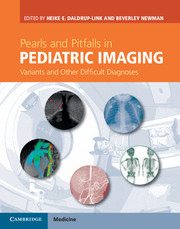Book contents
- Frontmatter
- Contents
- List of contributors
- Preface
- Acknowledgment
- Section 1 Head and neck
- Section 2 Thoracic imaging
- Section 3 Cardiac imaging
- Section 4 Vascular and interventional
- Section 5 Gastrointestinal imaging
- Section 6 Urinary imaging
- Section 7 Endocrine - reproductive imaging
- Case 67 Pediatric Graves’ disease
- Case 68 Thyroglossal duct cyst
- Case 69 Thyroid colloid cyst
- Case 70 Adrenal hemorrhage
- Case 71 Neuroblastoma
- Case 72 Ovarian torsion in childhood
- Case 73 Torsion of the appendix testis
- Case 74 Intratesticular neoplasms
- Section 8 Fetal imaging
- Section 9 Musculoskeletal imaging
- Index
- References
Case 70 - Adrenal hemorrhage
from Section 7 - Endocrine - reproductive imaging
Published online by Cambridge University Press: 05 June 2014
- Frontmatter
- Contents
- List of contributors
- Preface
- Acknowledgment
- Section 1 Head and neck
- Section 2 Thoracic imaging
- Section 3 Cardiac imaging
- Section 4 Vascular and interventional
- Section 5 Gastrointestinal imaging
- Section 6 Urinary imaging
- Section 7 Endocrine - reproductive imaging
- Case 67 Pediatric Graves’ disease
- Case 68 Thyroglossal duct cyst
- Case 69 Thyroid colloid cyst
- Case 70 Adrenal hemorrhage
- Case 71 Neuroblastoma
- Case 72 Ovarian torsion in childhood
- Case 73 Torsion of the appendix testis
- Case 74 Intratesticular neoplasms
- Section 8 Fetal imaging
- Section 9 Musculoskeletal imaging
- Index
- References
Summary
Imaging description
A seven-day-old neonate presented with a history of birth asphyxia and abdominal distension. A routine abdominal-renal ultrasound demonstrated incidental heterogeneous lesions in the bilateral suprarenal regions (Fig. 70.1). The lesions were relatively well defined, with mild compression of the upper poles of both kidneys. A review of prenatal ultrasound images (not shown) did not reveal any evidence for adrenal masses. The finding is most consistent with bilateral adrenal hemorrhages. A neuroblastoma is much less likely due to the bilateral nature of the lesions and the history of an acute occurrence.
Importance
The adrenal gland in neonates is large and susceptible to hemorrhage due to rapid regression of the fetal cortex during the neonatal period and markedly engorged vascular channels in the primitive cortex. Adrenal hemorrhage is postulated to occur either due to ischemic hemorrhagic infarction because of reflex vascular redistribution in response to asphyxia or rupture of engorged veins related to increased abdominal pressure and inferior vena cava (IVC) compression. A significant hemorrhage can result in hypovolemic shock and may present as a life-threatening emergency. In neonates, the development of adrenal insufficiency is rare.
- Type
- Chapter
- Information
- Pearls and Pitfalls in Pediatric ImagingVariants and Other Difficult Diagnoses, pp. 291 - 293Publisher: Cambridge University PressPrint publication year: 2014

